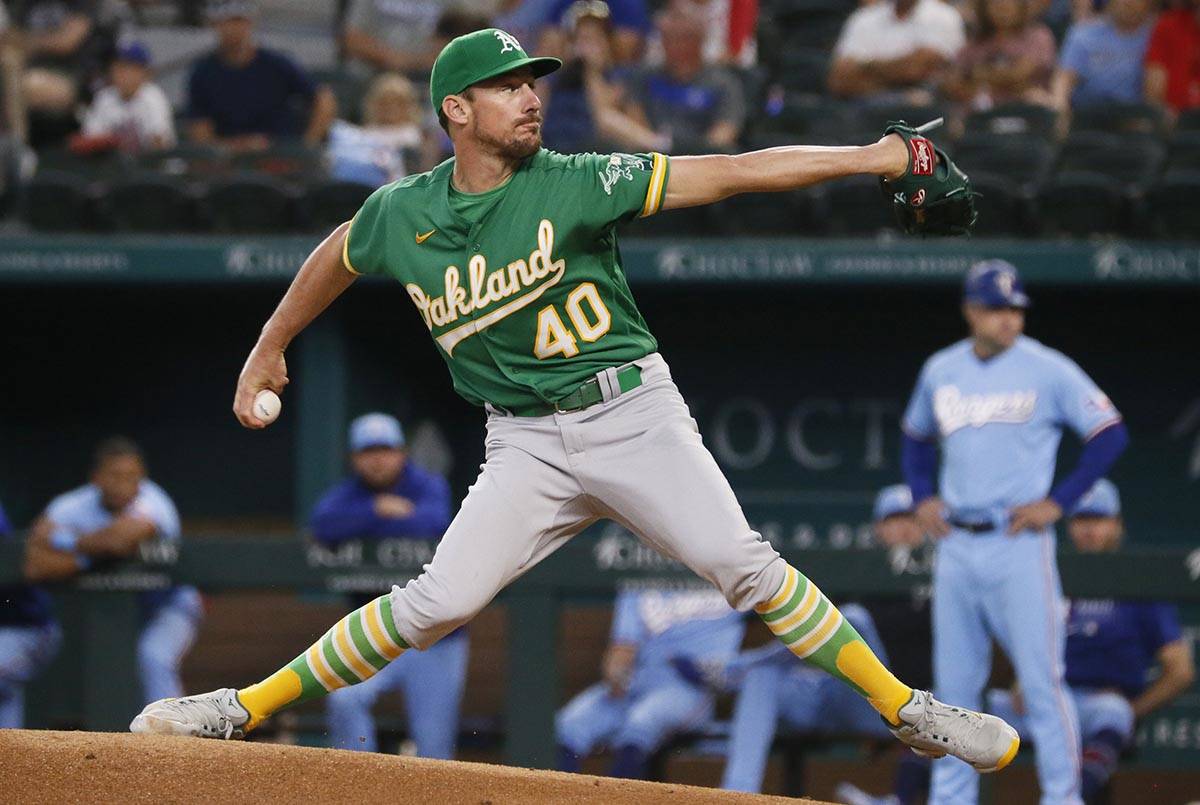EDITORIAL: The Oakland A’s massive leverage play
As the Oakland A’s astutely manipulate the chess board, Major League Baseball Commissioner Rob Manfred last week ran interference for the team’s Las Vegas leverage play. “Look, Las Vegas is a viable alternative for a major league club,” Mr. Manfred said during an All-Star break news conference. “And there are other viable alternatives that I haven’t turned the A’s loose to explore at this point. So thinking this is a bluff is a mistake. This is the decision point for Oakland as to whether they want to have Major League Baseball going forward.”
There’s plenty to unpack there for Southern Nevada officials. And despite the recent rah-rah civic rhetoric from Athletics’ ownership about the merits of Las Vegas, the team is on the prowl for money — and lots of it.
Few people think the A’s and MLB are bluffing. Team officials for nearly two decades have expressed dissatisfaction with Oakland Coliseum, now RingCentral Coliseum, which underwent renovations during the 1990s. While other major cities regularly build shiny new facilities to appease owners of major sports franchises, Oakland has so far resisted, leaving the A’s confined to what the San Jose Mercury News called “that drab, concrete monstrosity sitting off 66th Avenue.” Despite the MLB franchise stability over the past five decades, the Montreal Expos left Canada in 2004, and the promise of a new stadium elsewhere might indeed be enough to lure Oakland.
But history can be informative. The franchise dates to 1901 and was a mainstay in Philadelphia until moving west to Kansas City to start the 1955 season. Five years later, the mercurial Charlie O. Finley became majority owner, and the team was soon a perennial bargaining chip. During the 1960s, Mr. Finley threatened to move the A’s to more than a half-dozen cities but could never secure support from his fellow American League owners.
That changed during the 1967 offseason when the owners relented and approved a plan to move the Athletics to Oakland for the 1968 campaign. The franchise’s wanderlust, however, remained strong. Just 10 years later, Mr. Finley threatened to relocate to Denver. In fact, the Mercury News reported in May that, during the team’s 53-year run in Oakland, “there’s been at least nine times when it seemed plausible the franchise could be dug up and replanted elsewhere.”
The team’s current plan is to persuade the Oakland City Council to green-light a waterfront stadium and surrounding development. A vote to move the process forward is set for Tuesday with a binding vote likely in September. That explains why A’s executives have recently been touring new ballpark sites in Southern Nevada and lavishing plaudits on the region as a potential new home.
A’s President Dave Kaval told the Review-Journal last week that the team and Oakland officials remain at odds financially over the waterfront plans. “There’s still a very big gap,” he said, “over a half-a-billion dollar gap right now that we’re trying to work with.” Let that serve as a starting point for the taxpayer commitment the franchise would demand to move here.
And lest one think that the leverage tactics will end and Las Vegas will be the winner if Oakland refuses to sate the A’s, not necessarily. Mr. Kaval has been subtly playing various regions of the valley off of each other as he publicly scouts Henderson, Summerlin, downtown and the Strip for parcels that might become home to a state-of-the-art Las Vegas Athletics stadium. Smitten Henderson officials have hinted that they’re eager to discuss a public-private partnership with the team to win the A’s affections.
And what about those “other viable alternatives” that Mr. Manfred said he hadn’t yet “turned the A’s loose to explore”? In the unlikely event that Oakland takes a pass, they are more bargaining chips to use against Southern Nevada and to up the pressure for significant taxpayer participation.
The debut of major professional sports in Las Vegas has been a roaring success with the Golden Knights, Raiders and Aces. The community stands willing to enthusiastically support a Major League Baseball franchise. But the endgame for the Oakland A’s is to get as much money as possible out of somebody else to build their new home field. Local officials should keep an open mind but, absent concrete proposals, they should proceed cautiously and keep the checkbook in their pockets.




























